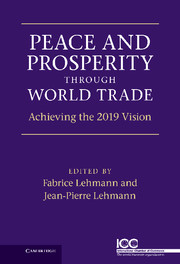Book contents
- Frontmatter
- Contents
- Notes on contributors
- Foreword
- Preface: the ICC vision
- Historical overview and dynamics
- Editorial note
- A Global systemic transformations
- B Governance of global trade
- Editorial introduction
- B1 Securing the global trade regime: the demand for global governance
- B2 The trade regime and the future of the WTO
- B3 WTO reform: the time to start is now
- B4 ‘Murky protectionism’ and the WTO
- B5 Preferential trade agreements: imagining a world with less discrimination
- B6 The G-20 after the Great Recession: rebalancing trade
- B7 The missing piece: global imbalances and the exchange rate regime
- B8 Trading knowledge fairly: intellectual property rules for global prosperity and environmental sustainability
- B9 Trade and subsidies: undermining the trading system with public funds
- B10 Trading labour: a dilemma for migration regimes
- C Poverty and global inequities
- D The long view on interlocking crises
- E Global business responsibilities
- Conclusion: the imperative of inclusive global growth
- Index
B9 - Trade and subsidies: undermining the trading system with public funds
Published online by Cambridge University Press: 05 July 2011
- Frontmatter
- Contents
- Notes on contributors
- Foreword
- Preface: the ICC vision
- Historical overview and dynamics
- Editorial note
- A Global systemic transformations
- B Governance of global trade
- Editorial introduction
- B1 Securing the global trade regime: the demand for global governance
- B2 The trade regime and the future of the WTO
- B3 WTO reform: the time to start is now
- B4 ‘Murky protectionism’ and the WTO
- B5 Preferential trade agreements: imagining a world with less discrimination
- B6 The G-20 after the Great Recession: rebalancing trade
- B7 The missing piece: global imbalances and the exchange rate regime
- B8 Trading knowledge fairly: intellectual property rules for global prosperity and environmental sustainability
- B9 Trade and subsidies: undermining the trading system with public funds
- B10 Trading labour: a dilemma for migration regimes
- C Poverty and global inequities
- D The long view on interlocking crises
- E Global business responsibilities
- Conclusion: the imperative of inclusive global growth
- Index
Summary
Despite the official optimism at the WTO, it is hard to hide the serious malaise that has taken grip of the multilateral trading system. Efforts to winch the Doha Round out of the ditch are proving much more strenuous than anticipated, and the feeling is spreading that there might be something more profoundly wrong with the system than we initially feared; or if not with the system, then certainly with our approach to expanding and consolidating it.
Ironically, this malaise strikes at a time when visible progress on concluding a trade deal could play an important role in helping put the world economy back on its feet. In fact, the loss of confidence in the trading system comes at the worst possible time. Trade offers a promising way for countries to grow their way out of the recession, and it offers to pay dividends faster than many of the other measures included in economic stimulus packages. Instead, there are ominous signs of resurgent protectionism. So far, most protectionist measures have been combated successfully, but no-one is sure how long the tide can be held off.
Surely, given both the dangers of protectionist escalation, and the role that robust trade could play in combating the recession, concluding the Doha Round and thereby rebuilding confidence in the trading system must be a high priority. But here is the paradox: there is broad agreement that expanding trade would be of great benefit at this time of economic downturn.
- Type
- Chapter
- Information
- Peace and Prosperity through World TradeAchieving the 2019 Vision, pp. 114 - 118Publisher: Cambridge University PressPrint publication year: 2010

